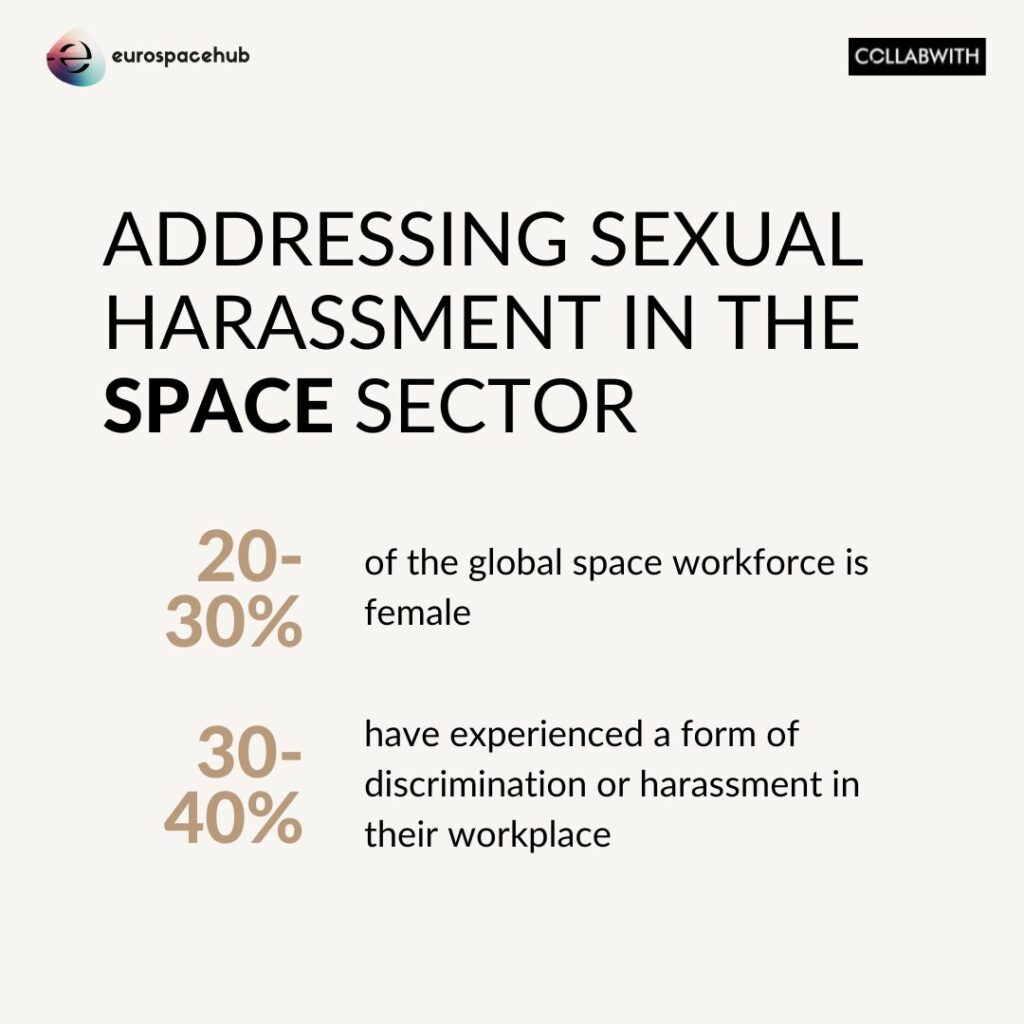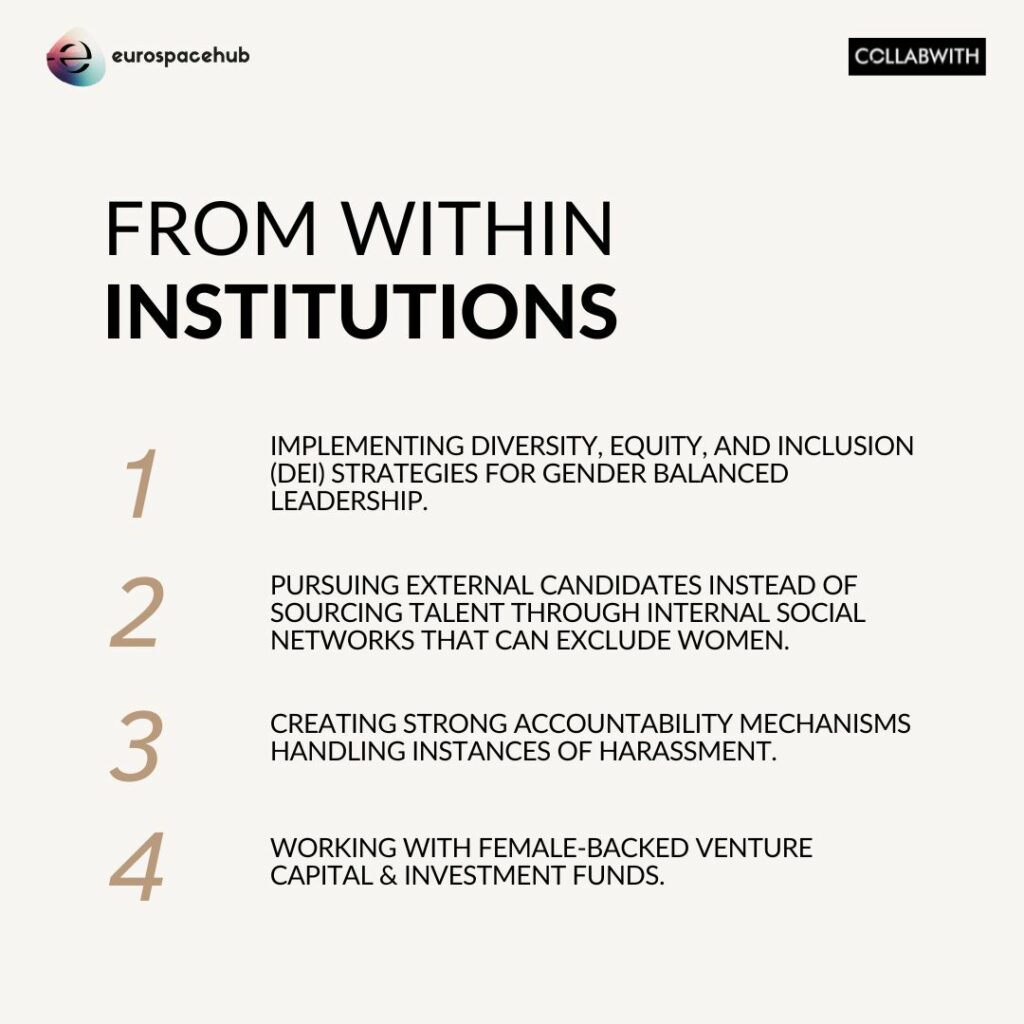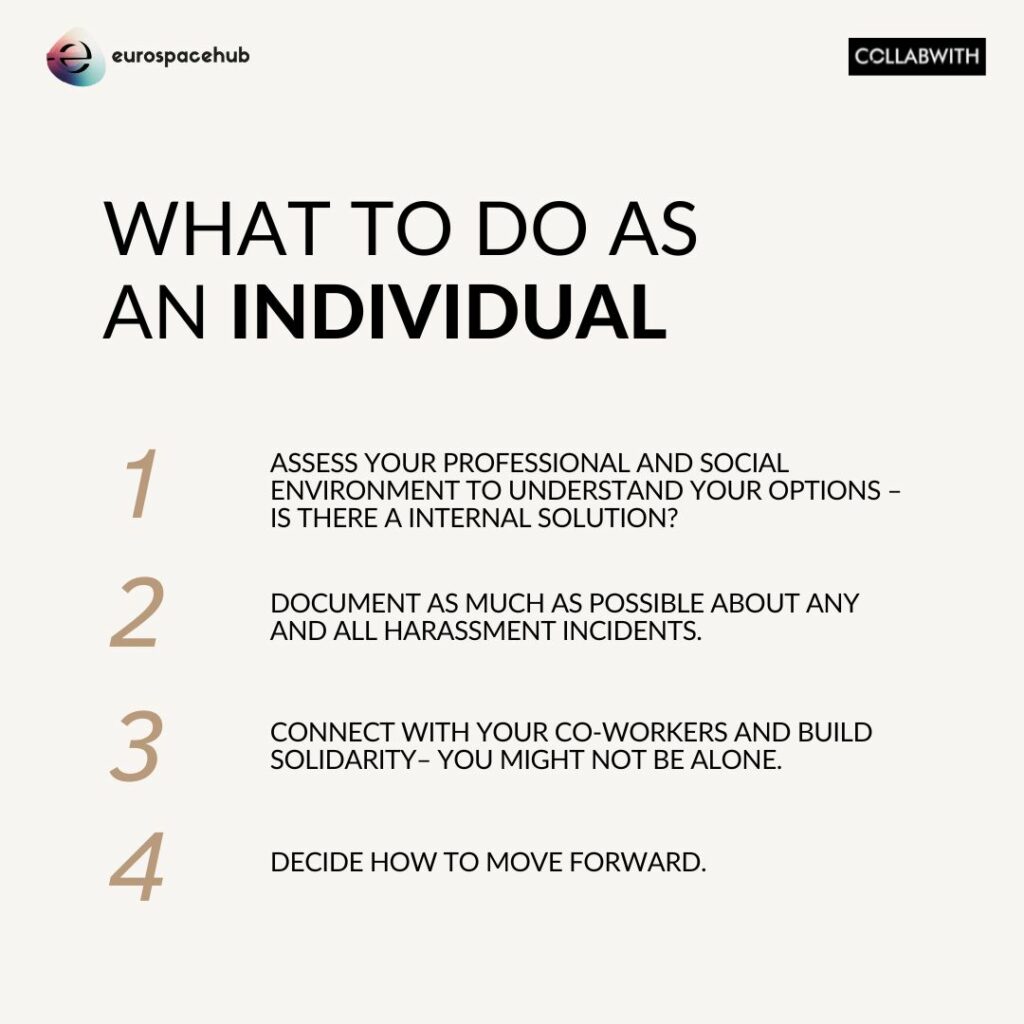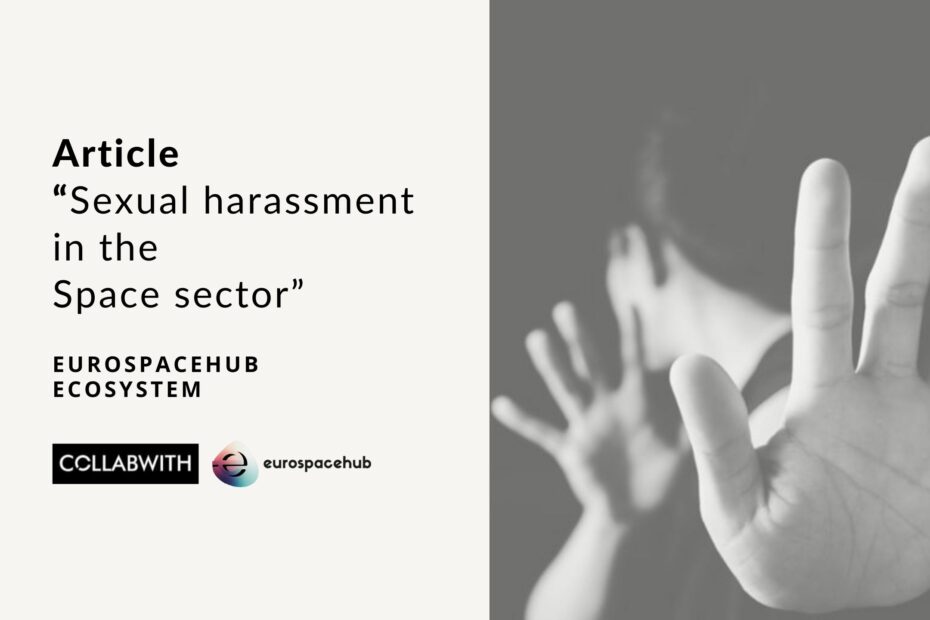The field of aerospace has captivated human imagination for decades, fueling groundbreaking technological advancements and remarkable discoveries. However, within this realm of scientific exploration, a sobering reality persists: gender discrimination and sexual harassment remain pervasive issues that harm the female members of the workforce and restrict female-led innovation. Despite the significant contributions made by this demographic, women face visible and invisible systemic barriers that stifle their potential opportunities in the European space sector and beyond.
The presence of gender discrimination in industry manifests itself in multiple ways, ranging from gender pay gaps and limited career advancement prospects to the pervasive underrepresentation of women in leadership roles and decision-making processes. This can have a snow-ball effect, especially when it comes to entrepreneurship, as discriminatory biases agains female CEOs and start-up founders can directly impact investment opportunities in the critical seed stage of a new business. In the academic subsector of the European space ecosystem, research on the topic shows that universities and research organisations are particularly toxic environments for women, where gender-based violence is exhibited via “scientific sabotage, sexual harassment, physical and verbal threats, denigration, exclusion, and problematising special needs” (Naezer et al. 2019). The issue of sexual harassment casts a shadow over the aspirations of women in aerospace and space sciences, eroding their sense of safety, confidence, and professional well-being.
In this article, EuroSpaceHub summarises some key inequalities in the various entrepreneurial, academic, and industrial corners of the space ecosystem in Europe, and provides you with some expert recommendations on how to effectuate change from within an organisation or institution, as well as on an individual level as a space professional that might be experiencing discrimination or harassment in their workplace.

Understanding Gender Power Imbalances in Space Industry and Academia
As space exploration was truly only kicked off in the 1950s, the aerospace sector is relatively young but growing fast. The issue with this is that it is growing skewed towards its male-dominated workforce, which alienates women from contributing to the essential infrastructure of public agencies as well as private corporations. Women make up about 20-30% of the global space workforce, with major disparities in age and job turnover in comparison to their male counterparts. In a study from the UK Space Agency, their national workforce is 29% female, 41% of which have experienced a form of prejudice or discrimination, and 53% of which say they do not always feel welcome in the sector compared to 21% of men (Thiemann & Dudley, 2022). Space is special in that it offers women high earning jobs in a fast growing sector, but there is an inevitable ceiling to these earnings as women receive fewer internal promotions and only make up around 19% of all leaders in aerospace and defence (UN Affairs News, 2021).
Academia experiences similar statistics, with less than 30% of space researchers being women despite rising numbers of women receiving higher education degrees in STEM fields (Gao et al., 2023), although academic environments can sometimes be less conducive to handling incidents of harassment. Experts note that in European universities and institutions, female PhD students, postdoctoral researchers, exchange students, and temporary contract workers are the most at risk for such incidents due primarily to male-dominated asymmetric power hierarchies and embedded student dependence on senior staff/faculty (Strid, 2021).
As the private sector of the space ecosystem grows as a result of the New Space movement, female space entrepreneurs are faced with an unequal playing field when competing to finance and launch their space tech start-ups. The very nature of starting a business demands an extremely high amount of initial seed stage investment to support the research, development, and commercialisation of the product or service – which leaves female CEOs at the mercy of male-led venture capital (VC) and angel investment funds, and ultimately their visible or invisible biases. In 2020, women-led SMEs received only 2.3% of venture capital funding. Ispace Europe S.A found that the smallest and newest space companies often have the best average gender balance, however rarely have female leadership and experience high female turnover, which only increases as they grow from small to medium sized organisations (Hutty, 2022). In the process of obtaining initial funding, an estimated 20% of female founders experience harassment from investors, which ranges from “inappropriate incidents” and “sexual badgering” to quid pro quo sexual coercion and unwanted sexual contact. One anonymous interviewee noted that she felt restricted from addressing her harassment because “VCs would penalize women for coming forward by icing them out of social and professional situations and denying them funding opportunities”(Martineau, 2018).
It is essential that those from all sectors of the space ecosystem begin to address these issues in a cohesive manner to establish a standard of best practices that will perpetuate itself as the space sector grows. As the proportion of female leadership in space industry and academia increases up to around 40%, so do the overall metrics of gender balance (Hutty, 2022). Similarly, when women hold C-Suite positions in investment funds, more female founders and businesses recieve more funding (Marikar, 2019). Placing women space professionals in positions of power uplifts the ecosystem as a whole by maximising opportunities for the application of expertise and the generation of innovative technologies and ideas, without which Europe risks crippling its space sector just as it takes off.
Addressing the Problem from within Institutions
The next step after understanding the multifaceted nature of gender discrimination is pursuing solutions to this pervasive problem at all levels. Within professional, academic, and research institutions, it is crucial to establish gender equality as a central pillar of the organisation’s culture and values through effective policies and strategies. These policies serve as a crucial framework to protect employees, students, and researchers from any form of harassment while promoting a culture of respect and equality. Here is a list of key sexual harassment prevention policies that can be adopted from within industry and academic institutions in the space sector to promote a professional atmosphere free from harassment.
- Implementing Diversity, Equity, and Inclusion (DEI) strategies and accountability metrics for gender balanced leadership. These can be strengthened through regular workshops and evaluations orchestrated by an independent and well-funded human resources team.
- Most VC firms and investment funds organise their human resource recruitment and functions from their internal pool rather than opting for external options, which can decrease the already low turnover of women members of the workforce. If firms want to prioritise diversity in their hiring, they should pursue external candidates instead of sourcing talent through internal social networks that many women are either not a part of, or are not willing to disrupt in the event of a harassment incident.
- Creating policies such as codes of conduct, employee handbooks, anti-harassment policies, and prevention programmes to address harassment and discrimination in their organizations.
- As a fund or start-up, looking to support or work with female-backed VC funds and investors. In 2021, start-ups created by women raised more than $40 billion which is almost double the amount invested in companies founded by women in all of 2020 or 2019– but still is only just 1.8% of total investment in Europe (de Bruin & Munoz, 2022). Women-led funds are doing their part to increase these numbers because as we noted previously, when women control funds, more women businesses receive support.

Addressing the Problem as an Individual
Experiencing sexual harassment in the workplace is an unfortunate reality for many individuals, and it is essential to empower individuals with knowledge and strategies to navigate such challenging situations and ensure their well-being. In this article, we present a list of recommendations from experts to guide individuals who find themselves facing gender-based discrimination in the space sector. These recommendations aim to provide practical and actionable steps for handling these distressing incidents, protecting one’s rights, and seeking the support needed to address the situation effectively (Cooper, 2019).
- Assess your professional and social environment to understand what your options are. You should ascertain how prepared your organisation is and how seriously they would take an incident of sexual harassment, which includes reading the company policy and determining if the report procedure seems productive in your situation (which can vary if, for example, your harasser is capable of reading your report). If you are under any sort of confidentiality or N.D.A. agreement you should be aware of how that might impact a report. Given the financial and emotional toll that sexual harassment can take, do an inventory of your sources of support to understand if you have family and friends who can support you if you need to leave your job.
- It is absolutely critical to document as much as possible about any and all harassment incidents including the date, time, location, what happened or was said, and anyone that might have been a witness or involved. This includes copies or pictures of incriminating texts, emails, social posts, etc., and it is highly encouraged that you tell co-workers or colleagues and document when and where you told them. The vast majority of harassment falls into one of two categories, hostile work environment harassment (“unwanted behavior that is severe or pervasive and disrupts or interferes with your work” such as unconsentual touching, sharing explicit content, or sending suggestive emails or texts), or quid pro quo harassment (“when some aspect of your employment is contingent upon fulfilling a sexual request”). Especially if you are being threatened with quid pro quo harassment, it is important to keep records of your job performance, although it is a good idea to do so regardless of how you are being discriminated against.
- The final step is deciding how you want to move forward with the situation. Depending on your situation, you can choose to stay the course and hope that the incident(s) do not repeat, or you can clearly state to your harasser that you are uncomfortable and you wish for their behaviour to stop. You can also connect with your co-workers and build solidarity in the event that you need support or you are not the only one experiencing discrimination. The final options would be making a claim either by submitting a report through your employer’s procedure, and if that is not possible, speaking with your superior or human resources, and if that too fails, speaking with an employment lawyer about your legal options.

In conclusion, the establishment of robust mechanisms to prevent sexual harassment and promote gender equality in the industrial, academic, and research sectors of the space industry is of paramount importance. Such mechanisms not only protect individuals from harm, but also enhance EuroSpaceHub’s goals of productivity, innovation, and collaboration in the European space ecosystem. It is essential that all entities within the sector commit to implementing and upholding these mechanisms, which they can do internally as well as externally by connecting with organisations such as the United Nations Office on Outer Space Affairs Space4Women programme. By fostering inclusive and respectful environments, we can ensure that all individuals, regardless of gender, can contribute their talents and expertise to the advancement of space exploration and research.
Naezer, Marijke & van den Brink, Marieke & Benschop, Yvonne. (2019). Harassment in Dutch academia Exploring manifestations, facilitating factors, effects and solutions,
Thiemann, H. & Dudley, J. (6 Oct, 2022). Women in the UK Space Sector. Space Skills Alliance, https://spaceskills.org/census-women#education-and-work-choices.
UN Affairs News, (4 October 2021). “Only around 1 in 5 space industry workers are women”, United Nations News, https://news.un.org/en/story/2021/10/1102082.
Gao, L. et al. (2023). “Women in Aerospace Engineering Research”, Frontiers Media S.A., https://www.frontiersin.org/research-topics/52756/women-in-aerospace-engineering-research#overview.
Strid, S. (21 May 2021). “On the importance of addressing gender-based violence in universities and research organisations”, UniSafe European Science Foundation, https://unisafe-gbv.eu/blog/on-the-importance-of-addressing-gender-based-violence-in-universities-and-research-organisations/.
Hutty, A. (16-19 August 2022). “Old Space and New; Lessons on the Attraction, Development and Retention of Female Talent”, Space4Women Expert Meeting South Korea, Ispace Europe S.A., https://space4women.unoosa.org/sites/space4women.unoosa.org/files/media-youtube/-abbie_hutty_un_s4w_session_2.pdf
Martineau, P. (15 October 2018). “Female Founders Still Face Sexual Harassment From Investors”, WIRED, https://www.wired.com/story/female-founders-still-face-sexual-harassment-from-investors/
Marikar, S. (1 March 2019). “When Women Control the Money, Female Founders Get Funded”, New York Times, https://www.nytimes.com/2019/03/01/business/female-founders-venture-capital.html?action=click&module=RelatedLinks&pgtype=Article.
de Bruin, S. & Munoz, M. (2022). European Women in VC: Analysing the Role and Importance of Women as Cheque Writers and Start-Up Founders. IDC #EUR148997722, https://europeanwomeninvc.idcinteractive.net/.
Cooper, M. (2019). “What to Do If You’re Being Sexually Harassed”, New York Times, https://www.nytimes.com/guides/working-womans-handbook/what-to-do-if-youre-being-sexually-harrassed
ABOUT EUROSPACEHUB
EuroSpaceHub is a group of 5 founding members, VilniusTECH, International Space University, Complutense University Madrid, Lunex Foundation and Collabwith Group.
EuroSpaceHub aims to connect digitally the space ecosystem in Europe, from tech transfer offices to industry, space accelerator networks, research centres, and other universities. The project will allow these actors to easily connect with financial opportunities from the Horizon Europe framework, the venture capital programme, and the InnovFin initiative. EuroSpaceHub will bridge the gap between academic institutions and industry using a collaborative mindset and entrepreneurship programmes inside the universities connected through tech transfer offices.
ABOUT COLLABWITH
Collabwith is a technology and a service to structure collaboration for innovation. It’s a tool to connect academics-startups-organizations. Because a tool is not enough to transform how you collaborate, here we have created a new methodology, personalized trainings, a new way of communication and a tailored made consulting for you to be more effective and efficient, now.
Grow your business and innovation through smart collaborations with Collabwith innovative and holistic approach to collaboration.
CollaborationXInnovation Platform: https://platform.collabwith.co
Do you want to know more? Book a demo with us, Contact us here.

EUROSPACEHUB IS FOUNDED BY VILNIUSTECH, INTERNATIONAL SPACE UNIVERSITY, COMPLUTENSE UNIVERSITY OF MADRID, COLLABWITH, LUNEX FOUNDATIONS AND FUNDED BY THE EIT HEI INITIATIVE LEAD BY EIT MANUFACTURING & EIT RAW MATERIALS.
